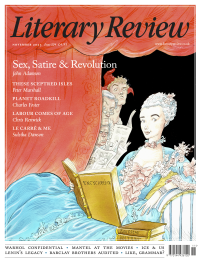Robert Colls
The Umpire Strikes Back
More Than a Game: A History of How Sport Made Britain
By David Horspool
John Murray 336pp £25
We kick off with Chloe Kelly’s goal for England against Germany in the final of the 2022 UEFA Women’s Euro at Wembley. The crowd went wild, Kelly ran to the corner flag swinging her shirt above her head and all thoughts turned to 1966. We are told that this was ‘a cathartic moment with very long roots’.
David Horspool’s subject is sport as part of our national imagination and identity. Chapter one dips into medieval tournaments – not exactly international sport in the Kelly shirt-round-your-head style, but we get what he means. He sees the first son of Henry II, Henry the Young King, as a ‘medieval playboy’ and ‘perhaps the first English royal who can accurately be described as sports-mad’.
In chapter two, ‘Horse-Racing’, we move forward five hundred years. The horse and the horseman had been central to gentlemanly values since the early modern period and ‘racing’ (the only sort that mattered) remained the most popular sport in Britain into the 1930s, when football took over. Most

Sign Up to our newsletter
Receive free articles, highlights from the archive, news, details of prizes, and much more.@Lit_Review
Follow Literary Review on Twitter
Twitter Feed
Alfred, Lord Tennyson is practically a byword for old-fashioned Victorian grandeur, rarely pictured without a cravat and a serious beard.
Seamus Perry tries to picture him as a younger man.
Seamus Perry - Before the Beard
Seamus Perry: Before the Beard - The Boundless Deep: Young Tennyson, Science, and the Crisis of Belief by Richard Holmes
literaryreview.co.uk
Novelist Muriel Spark had a tongue that could produce both sugar and poison. It’s no surprise, then, that her letters make for a brilliant read.
@claire_harman considers some of the most entertaining.
Claire Harman - Fighting Words
Claire Harman: Fighting Words - The Letters of Muriel Spark, Volume 1: 1944-1963 by Dan Gunn
literaryreview.co.uk
Of all the articles I’ve published in recent years, this is *by far* my favourite.
✍️ On childhood, memory, and the sea - for @Lit_Review :
https://literaryreview.co.uk/flotsam-and-jetsam